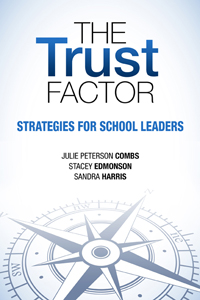Trustworthy Advice about Trust
The Trust Factor: Strategies for School Leaders
by Julie Peterson Combs, Stacey Edmonson and Sandra Harris
(Eye on Education/Routledge, 2013 – learn more)
Trust is difficult to define. It is a relationship between individuals. It is an environment. It is like an essential element in the air that allows individuals and their organizations to breathe. However, it often goes unnoticed in high trust organizations, and, in low trust organizations, the absence of trust may only be recognized when asphyxia takes hold and it’s too late.
Weaving together research, experience, and plain common sense, Combs, Edmonson, and Harris make the case that trust matters in schools. The case is well made. According to a 2002 study by Anthony Bryk and Barbara Schneider, there appears to be compelling evidence that the level of trust in schools is a stronger predictor of student achievement than socioeconomic status. On this basis alone, The Trust Factor should be required reading in all principal preparation programs.
What’s inside

1. Competence
2. Care
3. Character
4. Communication
Each of the 4 Cs are characteristics to which all educators should aspire; however, it never hurts to be reminded of where we should aim. In the final analysis, without trust, there will not be much effective teaching or learning taking place in or out of school.
The Trust Factor is organized into three main sections, each of which is then subdivided into 10-15 short (2-4 pages), easy-to-read chapters that contain quotes, resources, advice, and questions for reflection. At the end of each section, there is an assessment. The titles of the sections are:
1. Trust Busters
2. Trust Builders
3. Trust Boosters
The chapters are designed to be stand-alone, and, as such, can be read in any order. Both of the first two sections open with an attitude or behavior that either busts or builds trust in an organization. The authors then discuss the behavior, offering perspectives from research literature or personal experience.
Next comes a series of questions entitled “For Further Reflection,” which asks the reader to consider his or her practice. Finally, there is a very brief section called “Remember” at the end of each chapter, which sums up the “takeaway” for readers.
For example, Trust Buster #8 is entitled “It’s Not My Fault” and the takeaway is
Learning to accept being wrong or making a mistake is an important step in building trust. Accepting responsibility gives you the chance to show that you are human and that you can accept and learn from mistakes, even when they are not your own” (p.27).
The final section, Trust Boosters, is designed to help readers expand on the first two parts of the book. Really, it attempts to synthesize the concepts from previous sections in a positive, applicable manner. If the first section is the most important to stop doing, the lessons of this last one are possibly the most significant for leaders to start or continue to do.
Why this book is worth your time
Although school leaders and teachers will be familiar with many, if not all, of the concepts presented in the book, The Trust Factor is an excellent resource for a number of reasons.
I could see merit in an administrator browsing through it at the end of the summer because it touches on a number of issues of which a school leader should be mindful as we go into a new school year. It could also be useful for a school building’s leadership team to read and work through together as a professional development exercise. Alternately, this book could be an important resource to consult in times of crisis, or simply before a meeting of some sort.
All in all, The Trust Factor is an informative, practical resource for educators that sheds light on an important, but often overlooked, area of school life. Trust me :-)
James Jordan is the Assistant Middle School Principal at the Kinkaid School in Houston, Texas. Previously, he served as a teacher, coach, and assistant principal at Stratford Academy in Macon, GA. In the coming year, he hopes to finish his doctoral dissertation about e-mail and its impact on teachers’ work expectations. James maintains a professional blog at www.myindependenteducator.com



































1 Response
[…] recently read and reviewed a book on schools and trust for MiddleWeb. Click here for the […]